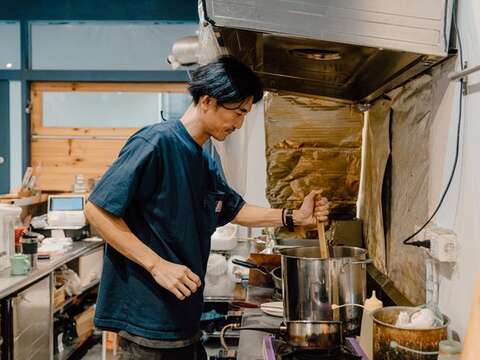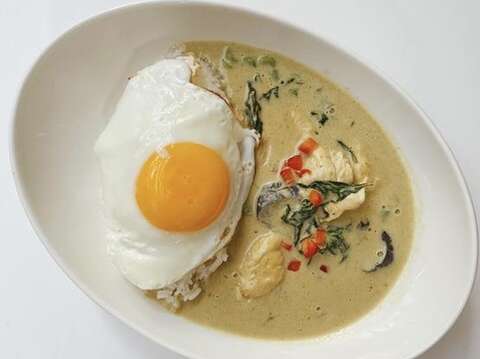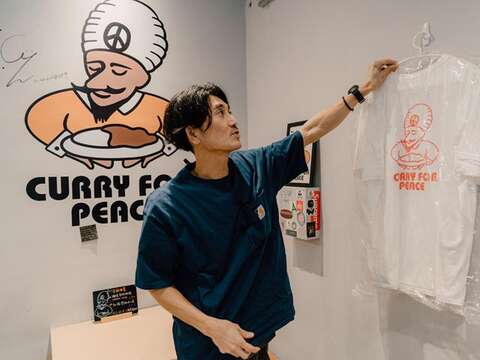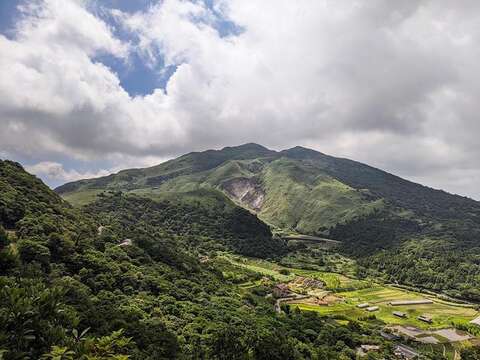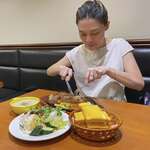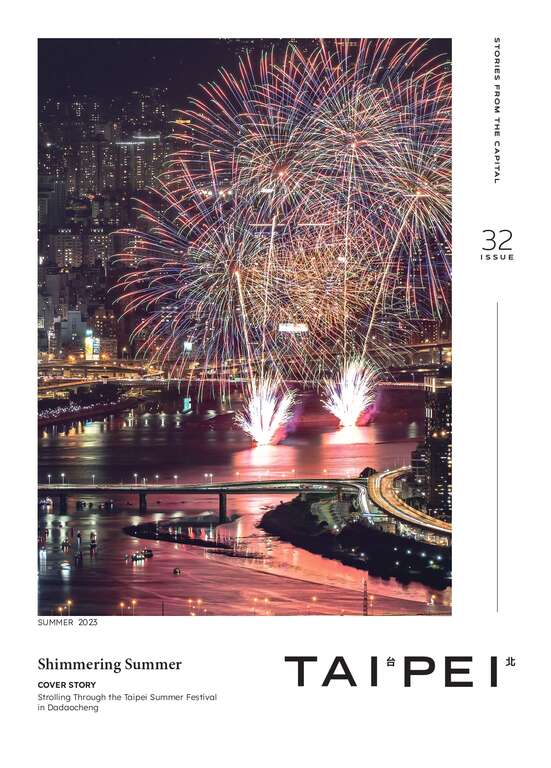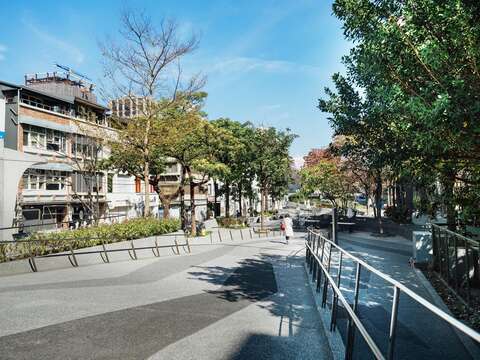Post date:2023-06-23
645
TAIPEI #32 (2023 Summer)
Living the “Slashie” Life in Taipei
Author Genie Zheng, Hsuan Yin Zhang
Photographer Samil Kuo, Curry For Peace, Taiwan Scene
Being a slashie — that is, holding two or more jobs in different industries at the same time — is a growing global trend, as well as an expression of a certain dexterous attitude toward life.
Although living the slashie life could be full of uncertainties and challenges, in Taipei, there is one such person who is always willing to try new things, brave the risks, and practice their problem-solving and self-management skills. In this issue, we chat with Shinichi Higuchi, originally from Fukuoka, Japan, a Taipei resident who has lived here over 20 years. Higuchi manages a curry shop and also works as a streetwear consultant. Let’s hear what he has to say about his life in Taipei and the differences in being a slashie in Taipei and Japan.
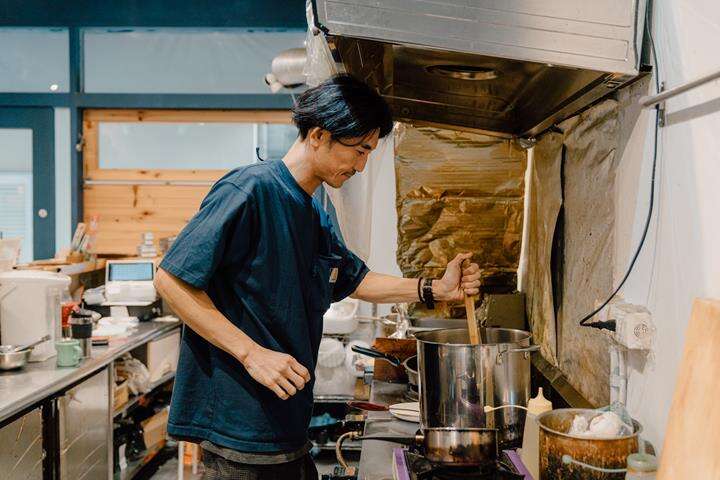 ▲Mr. Higuchi personally cooks spiced curry every morning.
▲Mr. Higuchi personally cooks spiced curry every morning.
Q1 What brought you to Taipei?
A relative of mine said that Greater China was the future, so I came to Taipei around 2003 or 2004 and headed off to National Taiwan Normal University (國立台灣師範大學) to learn Chinese. I also made a lot of Taiwanese friends, which helped me improve my Chinese proficiency very quickly by talking with locals ― in less than six months I could speak Chinese. Then I found a job in the hotel industry. My job was stable, so I just stayed in Taipei.
Q2 What do you think of Taipei?
I’m from Fukuoka, which geographically speaking is roughly the same size as Taipei, and the climate is also similar, so Taipei feels quite familiar to me. Everyone is very friendly. Back when I was new to Taipei, I had to ask for directions everywhere I went. The people I asked would often take me straight to where I needed to go. That would never happen in Japan. There, people only tell you how to get somewhere ― they would never personally show you the way. So that was a pleasant surprise for me when I first arrived.
Q3 You started out working in the hotel industry in Taipei, but now you run a curry shop and work as a streetwear consultant. Can you tell us what led you to make this switch?
Before the pandemic I worked in the hotel industry. I also ran a curry shop at the same time because it was my passion. The pandemic was a major blow to the tourism industry, so I left my hotel job to focus on my curry shop.
As for streetwear, a friend of mine returned to Taiwan from the U.S. more than a decade ago to run a streetwear apparel business. He doesn’t speak Japanese, so I help him communicate with companies in Japan. Besides, I worked in the apparel industry back when I was in Japan, which is why I know a fair amount about it. So, when my friend invited me to work with him, I joined him as a consultant. I help out with his business in my spare time.
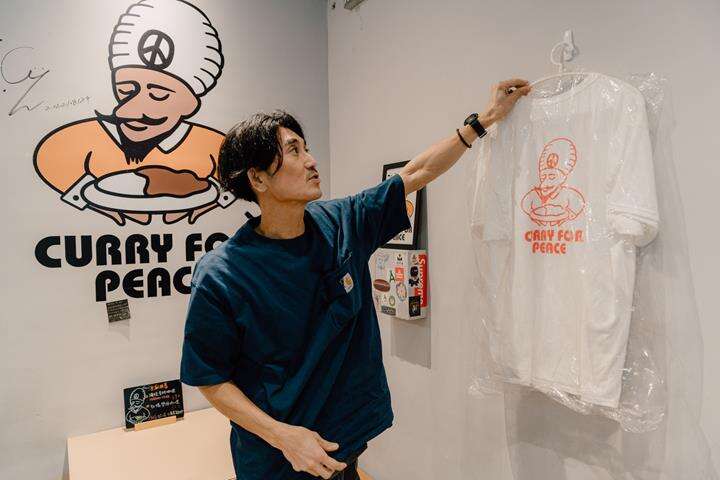 ▲As a streetwear consultant, Higuchi displays some collaborative items inside the store.
▲As a streetwear consultant, Higuchi displays some collaborative items inside the store.
Q4 What have you observed about being a slashie in Taiwan and in Japan?
People in Taiwan are more open to different work models, so there’s more freedom to be a slashie. But starting ten years ago or so, ideas about work in Japan started to change. Fewer people count on staying with a single employer until they retire. This has led a lot of young people in Japan to become slashies nowadays. For example, one friend of mine works in a restaurant during the day, then bartends at night. He doesn’t do it to make more money ― he does it because it’s his passion.
This is a global trend. It’s a lifestyle you choose when you have more than enough passion, time, and energy. When you’re a slashie out of passion rather than due to economic pressure, it doesn’t feel hard. You can keep it up for a long time.
Q5 What made you decide to open a curry shop in Taipei?
Curry is my passion. Almost everyone in Japan likes curry. A high school classmate told me that a lot of the small independent spiced curry shops in Fukuoka each have their own curry recipe with a unique flavor. I love curry, so I threw myself into studying it. I learned from the most famous spiced curry chefs in Fukuoka. Then I opened my shop to introduce spiced curry to the people of Taipei.
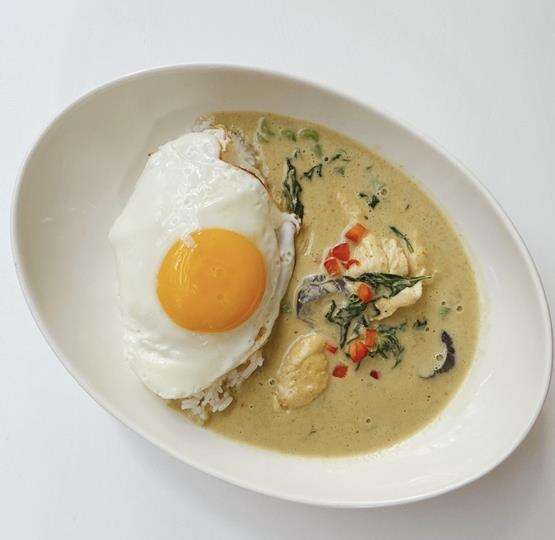 ▲The Green Curry, perfect for summer days, is one of the popular dishes in the shop. (Photo‧Curry For Peace)
▲The Green Curry, perfect for summer days, is one of the popular dishes in the shop. (Photo‧Curry For Peace)
Q6 Have you encountered any difficulties in running your curry shop?
In the past there weren’t too many places you could get spiced curry in Taipei, which is why I brought in this particular type of curry. At the beginning a lot of people gave me their feedback, saying things like the spice mix was too strong or too salty, so I made adjustments. Now most of my customers like it ― they tell me it’s delicious. I opened my shop more than six years ago. However, the pandemic started in the fourth year, and the number of customers visiting my shop plummeted, so I started selling frozen curry to maintain the business. As soon as the pandemic ended, customers came back.
Q7 Have you observed any differences between Taipei and Japan in terms of food preferences?
In Japan, the main flavors are sweet, salty, and spicy; there aren’t many bitter foods. But speaking of spiciness, in Taiwan it’s divided more finely into tingling or numbing (má, 麻) and burning (là, 辣) types. People here enjoy a wider range of flavors than people in Japan.
Take curry, for example. In Japan, curry is associated with spiciness. But in Taipei, people seem to expect curry to be sweeter. Most of my customers tend to choose curries on the sweet side. They also like deep-fried foods. But in Japan, curry shops rarely sell deep-fried things.
Also, Taipei has night markets every single day, and there are plenty of roadside food stalls, all selling things that are easy to eat on the go. In Japan, the restaurant industry is mostly made up of big companies. You only see food stalls during festivals, and they only have a fixed set of choices, like takoyaki, a Japanese street snack in the shape of little round balls containing pieces of octopus.
Q8 Can you tell us about your favorite places in Taipei?
I’ve lived in Neihu (內湖) for almost three years. It’s quiet and there aren’t too many cars. I only have to walk a few minutes to get to a park. It’s a very pleasant place to live. Sometimes I go to the hot springs in Beitou (北投), or to Yangmingshan (陽明山, Mt. Yangming) to take in the view at night. This is how I relax on weekends. Taipei’s suburbs offer hot springs and mountains, and transportation from the city center to the suburbs is very convenient. And when friends from Japan come to visit me, I take them on the Maokong Gondola (貓空纜車) because of the beautiful scenery in Maokong, and it’s also a good place to taste Taiwanese teas that you can’t get in Japan.
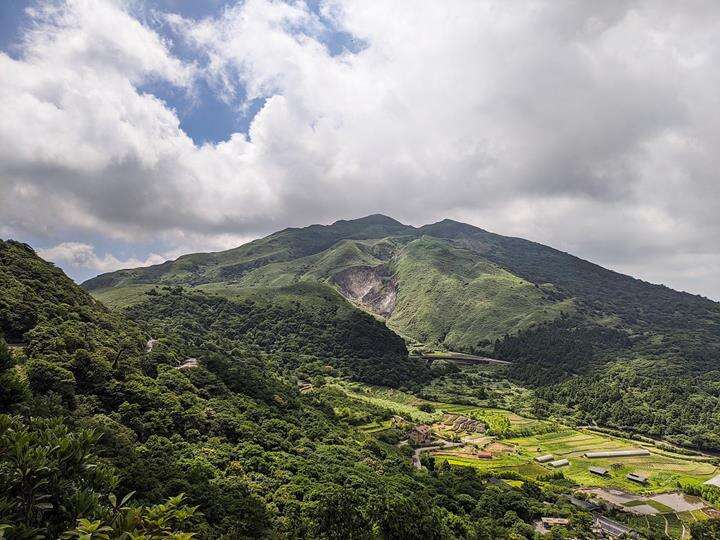 ▲Yangmingshan, with its vast greenery, is one of Higuchi's favorite spots in Taipei. (Photo‧Taiwan Scene)
▲Yangmingshan, with its vast greenery, is one of Higuchi's favorite spots in Taipei. (Photo‧Taiwan Scene)
Q9 As a streetwear consultant, you no doubt have your own observations and opinions on fashion. Have you noticed any changes in Taipei’s street fashion?
Ten or so years ago, men in Taipei tended to wear graphic tees. Trends were six or seven years behind Japan. But over the years, more and more people have taken an interest in fashion. They’ve become sensitive to trends, and have greater spending power. For instance, every time Akio Hasegawa, the famous Japanese stylist, posts a new product which he directs or collaborates with other brands on his own social media, streetwear fans from Taipei rush to buy it even faster than those from Japan. As a result, a fair number of fashion brands have gradually shifted toward Taipei.
Q10 You’ve lived in Taipei for more than twenty years. What’s something you like about this city?
I usually commute to work on a scooter, and getting around Taipei is incredibly convenient. It only takes about an hour’s drive to reach suburbs. While the city is often bustling with cars, traffic tends to be better during vacation periods. Personally, I find the city traffic in Taipei particularly enjoyable during the holidays, and riding a scooter feels remarkably comfortable, especially on long weekends.
🍴A curry pro recommends his favorite Taipei eats🍴
Ji Pin Guang Fu Vegetarian Baozi 極品光復素食包子
💬"The baozi (包子; steamed meat-filled buns) are enormous ― big enough to be a meal. Baozi fillings include cabbage, green beans, and many other kinds of vegetables."
ADD 95, Ln. 419, Guangfu S. Rd., Xinyi Dist.
HOURS 6:30am - 1:30pm (Closed on Mondays)
Honda Japanese Restaurant 本多日本料理
💬"The owner is from Fukuoka, too. When I want sushi, this is where I go."
ADD 15, Ln. 60, Dunhua N. Rd., Songshan Dist.
HOURS 11:30am - 2:00pm, 5:30pm - 9:30pm (Closed on Sundays)
Meinongwu 美濃屋
💬"They mostly sell ramen, but I recommend their chow mein (炒麵, fried noodles) and potstickers ― absolutely delicious! "
ADD 108-1, Sec. 1, Xinsheng N. Rd., Zhongshan Dist.
HOURS 5:00pm - 10:00pm (Tuesday to Friday)
12:00pm - 2:30pm, 5:00pm - 10:00pm (Saturdays)
12:00pm - 2:30pm, 5:00pm - 9:30pm (Sundays) (Closed on Mondays)
Right Ice Cream 來特冰淇淋
💬"Their ice cream and desserts come in flavors you can't find in Japan. I like them a lot. "
ADD 54, Ln. 36, Sec. 4, Bade Rd., Songshan Dist.
HOURS 1:30pm - 10:00pm (Closed on Tuesdays)
Living the “Slashie” Life in Taipei
Author Genie Zheng, Hsuan Yin Zhang
Photographer Samil Kuo, Curry For Peace, Taiwan Scene
Being a slashie — that is, holding two or more jobs in different industries at the same time — is a growing global trend, as well as an expression of a certain dexterous attitude toward life.
Although living the slashie life could be full of uncertainties and challenges, in Taipei, there is one such person who is always willing to try new things, brave the risks, and practice their problem-solving and self-management skills. In this issue, we chat with Shinichi Higuchi, originally from Fukuoka, Japan, a Taipei resident who has lived here over 20 years. Higuchi manages a curry shop and also works as a streetwear consultant. Let’s hear what he has to say about his life in Taipei and the differences in being a slashie in Taipei and Japan.
 ▲Mr. Higuchi personally cooks spiced curry every morning.
▲Mr. Higuchi personally cooks spiced curry every morning.Q1 What brought you to Taipei?
A relative of mine said that Greater China was the future, so I came to Taipei around 2003 or 2004 and headed off to National Taiwan Normal University (國立台灣師範大學) to learn Chinese. I also made a lot of Taiwanese friends, which helped me improve my Chinese proficiency very quickly by talking with locals ― in less than six months I could speak Chinese. Then I found a job in the hotel industry. My job was stable, so I just stayed in Taipei.
Q2 What do you think of Taipei?
I’m from Fukuoka, which geographically speaking is roughly the same size as Taipei, and the climate is also similar, so Taipei feels quite familiar to me. Everyone is very friendly. Back when I was new to Taipei, I had to ask for directions everywhere I went. The people I asked would often take me straight to where I needed to go. That would never happen in Japan. There, people only tell you how to get somewhere ― they would never personally show you the way. So that was a pleasant surprise for me when I first arrived.
Q3 You started out working in the hotel industry in Taipei, but now you run a curry shop and work as a streetwear consultant. Can you tell us what led you to make this switch?
Before the pandemic I worked in the hotel industry. I also ran a curry shop at the same time because it was my passion. The pandemic was a major blow to the tourism industry, so I left my hotel job to focus on my curry shop.
As for streetwear, a friend of mine returned to Taiwan from the U.S. more than a decade ago to run a streetwear apparel business. He doesn’t speak Japanese, so I help him communicate with companies in Japan. Besides, I worked in the apparel industry back when I was in Japan, which is why I know a fair amount about it. So, when my friend invited me to work with him, I joined him as a consultant. I help out with his business in my spare time.
 ▲As a streetwear consultant, Higuchi displays some collaborative items inside the store.
▲As a streetwear consultant, Higuchi displays some collaborative items inside the store.Q4 What have you observed about being a slashie in Taiwan and in Japan?
People in Taiwan are more open to different work models, so there’s more freedom to be a slashie. But starting ten years ago or so, ideas about work in Japan started to change. Fewer people count on staying with a single employer until they retire. This has led a lot of young people in Japan to become slashies nowadays. For example, one friend of mine works in a restaurant during the day, then bartends at night. He doesn’t do it to make more money ― he does it because it’s his passion.
This is a global trend. It’s a lifestyle you choose when you have more than enough passion, time, and energy. When you’re a slashie out of passion rather than due to economic pressure, it doesn’t feel hard. You can keep it up for a long time.
Q5 What made you decide to open a curry shop in Taipei?
Curry is my passion. Almost everyone in Japan likes curry. A high school classmate told me that a lot of the small independent spiced curry shops in Fukuoka each have their own curry recipe with a unique flavor. I love curry, so I threw myself into studying it. I learned from the most famous spiced curry chefs in Fukuoka. Then I opened my shop to introduce spiced curry to the people of Taipei.
 ▲The Green Curry, perfect for summer days, is one of the popular dishes in the shop. (Photo‧Curry For Peace)
▲The Green Curry, perfect for summer days, is one of the popular dishes in the shop. (Photo‧Curry For Peace)Q6 Have you encountered any difficulties in running your curry shop?
In the past there weren’t too many places you could get spiced curry in Taipei, which is why I brought in this particular type of curry. At the beginning a lot of people gave me their feedback, saying things like the spice mix was too strong or too salty, so I made adjustments. Now most of my customers like it ― they tell me it’s delicious. I opened my shop more than six years ago. However, the pandemic started in the fourth year, and the number of customers visiting my shop plummeted, so I started selling frozen curry to maintain the business. As soon as the pandemic ended, customers came back.
Q7 Have you observed any differences between Taipei and Japan in terms of food preferences?
In Japan, the main flavors are sweet, salty, and spicy; there aren’t many bitter foods. But speaking of spiciness, in Taiwan it’s divided more finely into tingling or numbing (má, 麻) and burning (là, 辣) types. People here enjoy a wider range of flavors than people in Japan.
Take curry, for example. In Japan, curry is associated with spiciness. But in Taipei, people seem to expect curry to be sweeter. Most of my customers tend to choose curries on the sweet side. They also like deep-fried foods. But in Japan, curry shops rarely sell deep-fried things.
Also, Taipei has night markets every single day, and there are plenty of roadside food stalls, all selling things that are easy to eat on the go. In Japan, the restaurant industry is mostly made up of big companies. You only see food stalls during festivals, and they only have a fixed set of choices, like takoyaki, a Japanese street snack in the shape of little round balls containing pieces of octopus.
Q8 Can you tell us about your favorite places in Taipei?
I’ve lived in Neihu (內湖) for almost three years. It’s quiet and there aren’t too many cars. I only have to walk a few minutes to get to a park. It’s a very pleasant place to live. Sometimes I go to the hot springs in Beitou (北投), or to Yangmingshan (陽明山, Mt. Yangming) to take in the view at night. This is how I relax on weekends. Taipei’s suburbs offer hot springs and mountains, and transportation from the city center to the suburbs is very convenient. And when friends from Japan come to visit me, I take them on the Maokong Gondola (貓空纜車) because of the beautiful scenery in Maokong, and it’s also a good place to taste Taiwanese teas that you can’t get in Japan.
 ▲Yangmingshan, with its vast greenery, is one of Higuchi's favorite spots in Taipei. (Photo‧Taiwan Scene)
▲Yangmingshan, with its vast greenery, is one of Higuchi's favorite spots in Taipei. (Photo‧Taiwan Scene)Q9 As a streetwear consultant, you no doubt have your own observations and opinions on fashion. Have you noticed any changes in Taipei’s street fashion?
Ten or so years ago, men in Taipei tended to wear graphic tees. Trends were six or seven years behind Japan. But over the years, more and more people have taken an interest in fashion. They’ve become sensitive to trends, and have greater spending power. For instance, every time Akio Hasegawa, the famous Japanese stylist, posts a new product which he directs or collaborates with other brands on his own social media, streetwear fans from Taipei rush to buy it even faster than those from Japan. As a result, a fair number of fashion brands have gradually shifted toward Taipei.
Q10 You’ve lived in Taipei for more than twenty years. What’s something you like about this city?
I usually commute to work on a scooter, and getting around Taipei is incredibly convenient. It only takes about an hour’s drive to reach suburbs. While the city is often bustling with cars, traffic tends to be better during vacation periods. Personally, I find the city traffic in Taipei particularly enjoyable during the holidays, and riding a scooter feels remarkably comfortable, especially on long weekends.
🍴A curry pro recommends his favorite Taipei eats🍴
Ji Pin Guang Fu Vegetarian Baozi 極品光復素食包子
💬"The baozi (包子; steamed meat-filled buns) are enormous ― big enough to be a meal. Baozi fillings include cabbage, green beans, and many other kinds of vegetables."
ADD 95, Ln. 419, Guangfu S. Rd., Xinyi Dist.
HOURS 6:30am - 1:30pm (Closed on Mondays)
Honda Japanese Restaurant 本多日本料理
💬"The owner is from Fukuoka, too. When I want sushi, this is where I go."
ADD 15, Ln. 60, Dunhua N. Rd., Songshan Dist.
HOURS 11:30am - 2:00pm, 5:30pm - 9:30pm (Closed on Sundays)
Meinongwu 美濃屋
💬"They mostly sell ramen, but I recommend their chow mein (炒麵, fried noodles) and potstickers ― absolutely delicious! "
ADD 108-1, Sec. 1, Xinsheng N. Rd., Zhongshan Dist.
HOURS 5:00pm - 10:00pm (Tuesday to Friday)
12:00pm - 2:30pm, 5:00pm - 10:00pm (Saturdays)
12:00pm - 2:30pm, 5:00pm - 9:30pm (Sundays) (Closed on Mondays)
Right Ice Cream 來特冰淇淋
💬"Their ice cream and desserts come in flavors you can't find in Japan. I like them a lot. "
ADD 54, Ln. 36, Sec. 4, Bade Rd., Songshan Dist.
HOURS 1:30pm - 10:00pm (Closed on Tuesdays)
Gallery
:::
Popular articles
 From Factory to Focal Point: Taipei’s Songshan Cultural and Creative Park (TAIPEI Quarterly 2023 Summer Vol.32)
From Factory to Focal Point: Taipei’s Songshan Cultural and Creative Park (TAIPEI Quarterly 2023 Summer Vol.32) From True Cost to Real Value: A Mother’s Fashion Crusade for a Sustainable Future (TAIPEI Quarterly 2023 Summer Vol.32)
From True Cost to Real Value: A Mother’s Fashion Crusade for a Sustainable Future (TAIPEI Quarterly 2023 Summer Vol.32) Taipei’s Star Coffee Shops Light Up the International Stage (TAIPEI Quarterly 2023 Summer Vol.32)
Taipei’s Star Coffee Shops Light Up the International Stage (TAIPEI Quarterly 2023 Summer Vol.32) The Sizzling Story of Taiwanese Iron-Plate Steak: A Journey Through Time and Taste (TAIPEI Quarterly 2023 Summer Vol.32)
The Sizzling Story of Taiwanese Iron-Plate Steak: A Journey Through Time and Taste (TAIPEI Quarterly 2023 Summer Vol.32) Living the “Slashie” Life in Taipei (TAIPEI Quarterly 2023 Summer Vol.32)
Living the “Slashie” Life in Taipei (TAIPEI Quarterly 2023 Summer Vol.32) Strolling Through the Taipei Summer Festival in Dadaocheng (TAIPEI Quarterly 2023 Summer Vol.32)
Strolling Through the Taipei Summer Festival in Dadaocheng (TAIPEI Quarterly 2023 Summer Vol.32)
 Living the “Slashie” Life in Taipei (TAIPEI Quarterly 2023 Summer Vol.32)
Living the “Slashie” Life in Taipei (TAIPEI Quarterly 2023 Summer Vol.32)